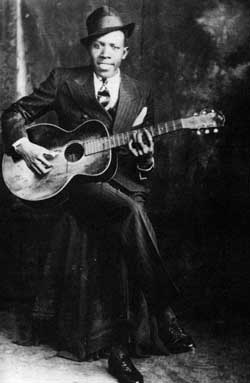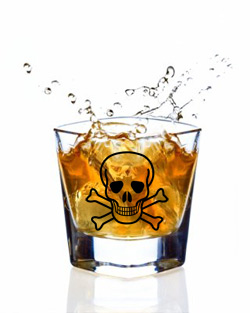
Many say he was murdered, poisoned by the jealous husband of one of the many women who caught his eye. But companions of Johnson’s say he drank heavily, especially illegal whiskey. So what happened and what’s the evidence? Did murder take the man who was arguably the greatest of Delta blues guitarists? Or did he die by his own hand, the one holding the bottle?
Johnson was born in Mississippi in 1911. What little is known about his life is thanks to blues performer John P. Hammond, who traveled throughout the South interviewing acquaintances and companions of Johnson, producing a documentary “The Search for Robert Johnson.” It is fortunate that he did as many of those folks are now gone.
No question exists that Robert Johnson was an incredible blues musician. Famed guitarists such as Keith Richards and Eric Clapton call Johnson the greatest there ever was. An old childhood friend of Johnson’s says that Robert’s first guitar was two strings strung on the wall of the shack he lived in with his mother and stepfather. Everyone agrees that his guitar playing left something to be desired, but around 1929, he appeared to have acquired an almost supernatural ability as a guitarist. Some put this down to a deal with the devil, but blues historians say that he studied with blues legends Son House and Ike Zimmerman during this time period. Whatever the reason, Robert Johnson took a step down the highway to fame.
For the next nine years, he became an itinerant musician, a “walking” musician as they were known in the Delta. He traveled with Dave “Honeyboy” Edwards and Johnny Shines from town to town, playing street corners and dance halls, gaining a reputation as one of the best. One of Johnson’s trademarks was the ability to be in a room of people and then leave without anyone realizing that he had gone. Johnny Shines always said that Johnson was a good traveling companion, though he was a mean drunk. And from the testimony of his contemporaries, Robert Johnson was drunk more than he was sober.
In the informal network that was the blues community of the 1930s, Johnson’s fame grew. He came to the attention of H.C. Speirs, a general store owner and talent scout in Jackson, Mississippi, who arranged a recording session for Johnson in San Antonio in 1936. One song emerged from that session as a hit, “Terraplane Blues,” about a new model car. But that touch of fame didn’t turn Johnson’s head. He soon returned to his life as a walking musician, traveling, according to some accounts, as far north as Chicago. In 1937 he returned to Texas, this time to Dallas, for another recording session. But again, he went on the road.
 August of 1938 found Johnson near Greenwood, Mississippi, traveling the juke joint and dance hall circuit with Dave Edwards. This is where things get murky. Everyone agrees that Johnson had his eyes on a married woman. And most agree that the woman’s husband knew of Johnson’s intentions. The facts are these: on or about August 13th, the 27-year-old Johnson began to feel ill. His condition worsened, pain in his abdomen became unbearable, and some witnesses say that he crawled on the floor and bayed at the moon in pain. On August 16th, Robert L. Johnson died in a shack in Greenwood.
August of 1938 found Johnson near Greenwood, Mississippi, traveling the juke joint and dance hall circuit with Dave Edwards. This is where things get murky. Everyone agrees that Johnson had his eyes on a married woman. And most agree that the woman’s husband knew of Johnson’s intentions. The facts are these: on or about August 13th, the 27-year-old Johnson began to feel ill. His condition worsened, pain in his abdomen became unbearable, and some witnesses say that he crawled on the floor and bayed at the moon in pain. On August 16th, Robert L. Johnson died in a shack in Greenwood.
Those are the generally agreed upon facts. But according to the late Dave Edwards, the husband of the woman that Johnson was eyeing arranged to have a bottle of poisoned whiskey slipped to Johnson. And then a second one. And that spelled the end of the greatest blues guitarist ever known.
Musicologist Robert “Mack” McCormick has claimed that he tracked down the killer. Almost before he started the interview, McCormick says that the man began giving an alibi. When McCormick pointed out that he hadn’t asked the man for an alibi, the alleged murderer broke down and confessed. The problem with McCormick’s story is that he refuses to name the suspect. Interviewed by John P. Hammond in his documentary on Johnson’s life, McCormick says that he has checked from time to time to see if the man has died, hinting that when that happened, he would reveal his identity. But, surely by now, by 2012, he has passed away. Even Dave Edwards, said to be the last survivor of the early blues musicians, has left this world. Still, no news from McCormick.
The symptoms described by witnesses could certainly have been caused by poison of some sort, though an early candidate, strychnine, has been ruled out, since it brings death much more swiftly than three days. But it could also have been bad whiskey, the cause of many a death.
Exhumation and forensic examination could decide the issue. But therein lies the last wrinkle in the enigmatic fabric of Robert Johnson’s death. No one knows for certain where he was buried. Three graveyards all have claims of varying credibility on Johnson’s remains. And since the grave was unmarked at the time of his death, no exhumation effort could ever be 100 percent certain that it had recovered Johnson’s body.
Ironically, Johnson died on the eve of what could have been the breakout event of his short life and career. He had been invited by music producer John H. Hammond (father of John P. Hammond) to participate in a concert at Carnegie Hall in New York: “From Spirituals to Swing.” When Hammond learned of Johnson’s death, he replaced him on the bill with Big Bill Broonzy, though two of Johnson’s songs were played in memoriam.
But Johnson’s death, like his life, remains more mystery than not. Perhaps the old stories are true. Perhaps Robert Johnson did sell his soul to the devil. And Satan came back to the Delta in 1938 and claimed the soul of the “walking” musician.
When Tony Hays isn’t traveling the world, teaching students, and adopting puppies, he takes time out to write the Arthurian Mystery series from Tor/Forge.
See all posts by Tony Hays for Criminal Element.

I think the insecure piece of shit who killed Robert Johnson had Antifreeze put in it cause it’s sweet so that could explain not only why Robert Johnson did not notice the poison, but also the long painful death. I had a cat die of Antifreeze poisoning and it was long and painful. We had to put her to sleep. But that would explain the on all fours, barking like a dog description. IT’s an extremely painful way to die. If Robert was with this man a lot then he may have been poisoned on many other occasions cause fro Honeyboy’s description Robert spent a lot of time with this man, while he was having relations with his wife.
Two bits of info…. Ethylene glycol, the green antifreeze we have all been using for as long as we can remember, did not replace ethylene oxide as the industry standard until 1937….Ethylene glycol solutions became available in 1926 and were marketed as “permanent antifreeze”… “Ethylene glycol is poisonous to humans and other animals,[3][4] and should be handled carefully and disposed of properly. Its sweet taste can lead to accidental ingestion or allow its deliberate use as a murder weapon.[5][6][7] Ethylene glycol is difficult to detect in the body, and causes symptoms—including intoxication, severe diarrhea, and vomiting—that can be confused with other illnesses or diseases.[3][7] Its metabolism produces calcium oxalate, which crystallizes in the brain, heart, lungs, and kidneys, damaging them; depending on the level of exposure, accumulation of the poison in the body can last weeks or months before causing death, but death by acute kidney failure can result within 72 hours if the individual does not receive appropriate medical treatment for the poisoning.[3] Some ethylene glycol antifreeze mixtures contain an embittering agent, such as denatonium, to discourage accidental or deliberate consumption.”
But it seems unlikely that someone would have anti freeze lying around in Mississippi. Kind of a luxury to have in August down south
I recall bloating is a symptom of antifreeze and would have been noted.
You just cant mess with a married woman and not get burned.
Love Robert’s music; he was an amazing blues artist and musician. But you can’t go around trying to take a married woman. To me, this flaw in his character really tarnishes my view of him.
Robert Johnson was just another lowlife, selfish alcoholic, womanizer, and absentee father. He died young and all of a sudden he becomes some sort of great man, like all young dead entertainers.